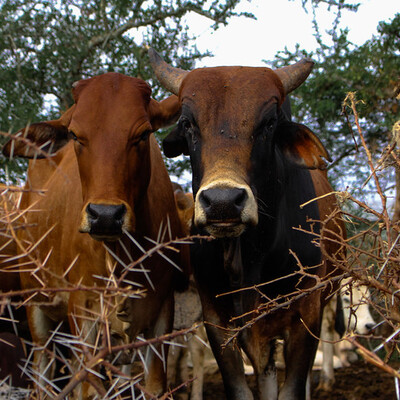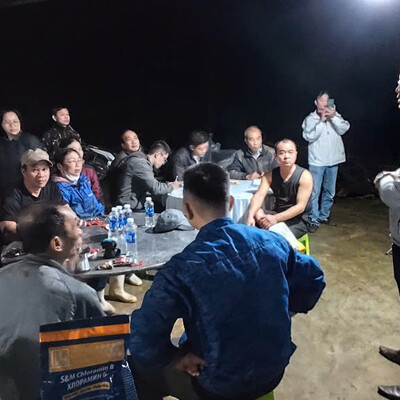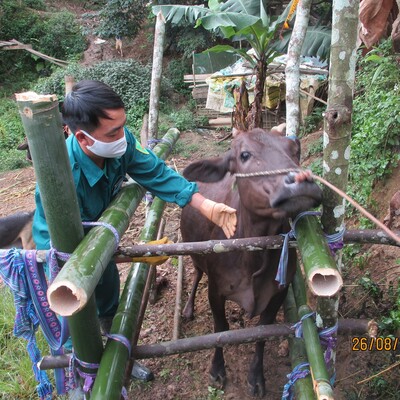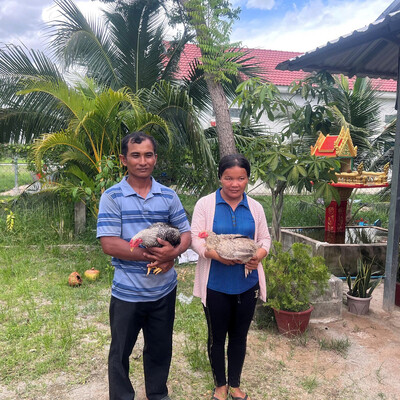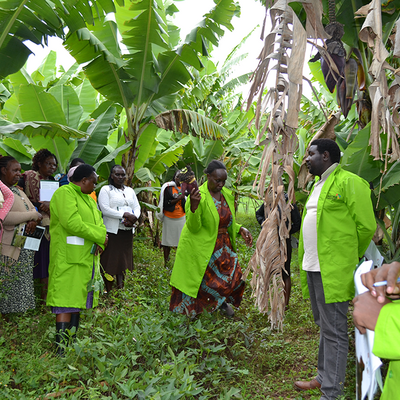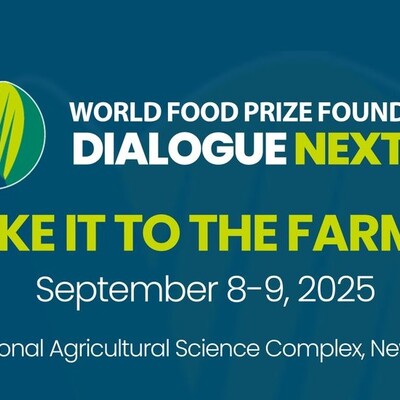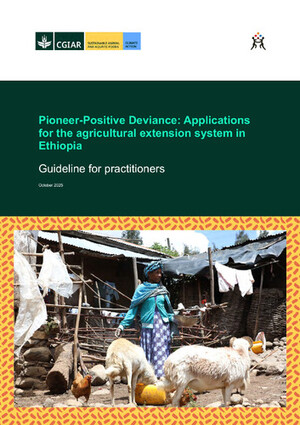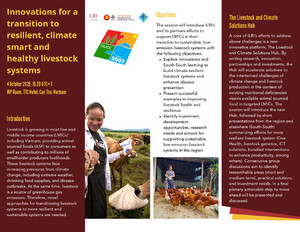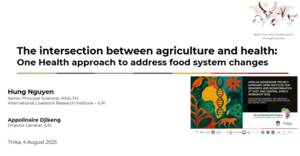
Remembering Michael Blümmel
It is with great sadness that we report the death of Michael Blümmel, a principal scientist and deputy program leader in the feed and forage development program at the International Livestock Research Institute (ILRI). Michael passed away on Monday, 12 Oct 2020, after a short illness in his hometown in Germany where he was receiving treatment.
 ILRI animal nutritionist Michael Blümmel in his office at the ICRISAT campus in Hyderabad, India (photo credit: ILRI/Stevie Mann).
ILRI animal nutritionist Michael Blümmel in his office at the ICRISAT campus in Hyderabad, India (photo credit: ILRI/Stevie Mann).
His many friends and colleagues at ILRI and the broader scientific community registered shock and dismay at his untimely passing, with many remembering his thoughtfulness and kindness as a colleague and mentor, as well as his scientific skills in animal nutrition and feed production.
‘We will miss Michael not only for his scientific contributions but for the calm and caring human being he was’, said ILRI director general Jimmy Smith.
‘This loss will reverberate throughout the world of animal nutrition within CGIAR and many, many national partners as well’, said Shirley Tarawali, assistant director general at ILRI. She added, ‘Michael understood very well how sound science related to real issues facing farmers and others on the ground.’
Susan MacMillan, team leader in communications and advocacy at ILRI, remembered Blümmel for his ability to synthesize even arcane scientific facts into the bigger picture: ‘In Michael Blümmel’s technical proficiency, his mastery of his chosen discipline and his passion for science, he exemplified for me the “scientist’s scientist”, she said.
Blümmel was an animal nutritionist with a Dr. Sc. (1994) and a Habilitation (2004) degree from the University of Hohenheim in Germany. He had more than 30 years of experience in teaching, development, research and research management in Europe, US, Africa and Asia–many of those years with ILRI, with whom he had worked since 2001. He had more than 250 scientific publications, about half of them peer reviewed.
Blümmel had a passion for bringing science and development together, building partnerships with the private and public sector to mitigate feed and fodder shortages and generate employment and income opportunities for the rural disadvantaged. In one of his recent projects, he worked with small-scale women dairy producers in India to explore the benefits of growing forage plants as a cash crop.
In another, even more ambitious project, he sought to leverage spin-offs from second-generation biofuel technologies to upgrade animal feeding. Biofuel scientists have recently developed novel ways of splitting off the glucose in the plant cell walls to convert it into ethanol. By treating cereal straws and stovers—the ‘residues’ of cereal crops after their grain has been harvested—with these processes, he showed how these crop residues could be turned into nourishing feed for ruminant farm animals. That project demonstrated the reach of Blümmel’s ambition: Not only would the project help farmers meet their animals’ fodder needs and create new income opportunities for the rural poor, but by collecting for use rather than burning the residues, it would help reduce the air pollution that often afflicts many Indian cities.
Blümmel’s focus on topics like crop residues, which are not perhaps the most glamorous of issues, spoke to his immensely practical frame of mind. As he often noted, ‘Feed resourcing and feeding is at the very interface where the positive and negative effects of livestock, income, livelihoods and the environment are negotiated.’
‘Michael virtually single-handedly put the growing importance of crop varieties bred for animal as well as human consumption “on the map” in the global livestock-research-for-development agenda’, said MacMillan. ‘In this work, quite unusually for a “livestock scientist”, he worked intimately and brilliantly with crop scientists throughout the world and throughout his career.’
Memories and tributes to Blümmel continue to arrive as news of his untimely death spreads throughout the ILRI community and beyond. If you would like to pay your respects, please leave a comment in the comment box below this article as posted on the ILRI News blog site (https://news.ilri.org/).
Following are among the tributes that have already come in:
I have known Michael since 2001 when we were both were scientists at ILRI working on the improvement of feed quality of crop residues, the dominant feed for livestock in the developing tropics. From that time until his illness his passion for his work remained a constant—as was the diligence with which he ensured that his work benefitted small holder farmers. His legacy will be the in the conversion of legions of reluctant crop breeders who saw ‘grains’ solely as the target of their breeding programs, into advocates of breeding for improved feed value as well. We will miss Michael not only for his scientific contributions but for the calm and caring human being he was.
—Jimmy Smith, ILRI director general
For all of us at ILRI, saying farewell to a friend, colleague and outstanding scientist in Michael Blümmel is deeply moving and painful.
What occurs to me is that this loss will reverberate throughout the world of animal nutrition within CGIAR and many, many national partners as well. And why? I think in many instances, a transformation of crop breeding approaches that for the first time took account of the feed value of crop residues has to be largely attributed to Michael. I recall working in Nigeria in the 1990s when ILCA and then ILRI started to explore this issue, with IITA and ICRISAT initially. While we had a lot of work that made the case – farmers’ and field studies, Michael took this to the next level and found ways to use smart science to bring this into the portfolios of crop breeding and selection where it remains to this day.
Michael also understood very well how this very sound science related to real issues facing farmers and others on the ground. I recall visiting farms in Anantapur, seeing dual purpose groundnut varieties, touring sorghum stover markets in Hyderabad, with Michael always linking what we saw to what was going on in the labs and breeding fields. And doing so with his typical humility, commitment and purpose.
Highly respected, totally practical, astute scientist, friend and colleague. Michael you’ll be missed. Rest in peace.
—Shirley Tarawali, ILRI assistant director general and board secretary
I feel an enormous sadness following the death of my friend and colleague Michael Blummel. Michael was involved in my recruitment to ILRI in 2007. We worked closely over the years on many things in Ethiopia, India, Nigeria and elsewhere. Michael came from the European community of ruminant nutritionists. He had a deep understanding of ruminant nutrition and was a welcome source of technical advice on all matters relating to nutrition. He maintained his reputation as a sound technical researcher throughout his career but I noticed a change in his approach over the years I knew him: he became increasingly attuned to the smallholder perspective and sought solutions that would make sense in the practical context of smallholder farming. He had little patience for well-meaning scientists who came with impractical solutions. I was sometimes shocked by his abrupt manner in meetings when dealing with such scientists, but he gained respect across the board as witnessed by the many glowing tributes that have been written since his passing. As well as his scientific credentials Michael was a very kind person. Beneath his apparently gruff exterior he hid great warmth. He was always keen to connect in Ethiopia when he visited from India and would often bring gifts of Swiss chocolate from Dubai. He showed great concern for his staff and colleagues. He had an excellent sense of humour – he was the master of the one-line emails which were often hilarious. Michael was rather shy by personality and would often avoid social gatherings. However, he would occasionally invite a few of us over when we were in Hyderabad and ply us with German beer over which we would while away a pleasant evening. Michael’s passing leaves a huge hole in our programme and his will be difficult shoes to fill. But he left a great legacy and achieved so much in his 20 years with ILRI. May he rest in peace….
—Alan Duncan, principal livestock scientist, ILRI
Michael Blümmel’s scientific career embodied talent, productivity and more than occasional brilliance.
In my (former Berkeley) literary life, there were writers we cared about, and then there were the ‘writer’s writers’ we obsessed about. In Michael Blümmel’s technical proficiency, his mastery of his chosen discipline and his passion for science, he exemplified for me the ‘scientist’s scientist’.
Like the ‘writer’s writer’, while widely admired by his scientific colleagues, much of his communications, as critical and precise as only a German’s can be, were technically heavy-going—sometimes obscure to lay publics. He appeared to find it hard to ‘talk down’ to non-scientists, expecting, rather, that we simply apply ourselves to the logic and details of the matter at hand.
But Michael also had a knack for saying the essential things, for wide understanding and appreciation of ‘the big picture’ into which his meticulous science fit and advanced. Once, in just two minutes over a tea break at a research meeting, Michael explained to me in three ‘bullet points’ just why animal feed science was a cornerstone of sustainable development, positioned as it was at the very intersection of the future of environmental, economic and human well-being.
Michael was an exceptionally generous as well as productive scientist. He championed younger colleagues, inspiring confidence and—beyond normal loyalty—what can only be called ‘devotion’ among his many Indian technical staff in Hyderabad, India, where he ran an ILRI feed laboratory at the International Crops Research Institute for the Semi-Arid Tropics for many years. On a field visit I made to his Hyderabad projects many years ago, one after another of his technicians took me aside to tell me that Michael was held in the very highest regard. They could only hope, they said, for the privilege of working with him for the rest of their professional lives.
Those of us at ILRI who had the privilege of working with Michael for many years will badly miss him and his wry sense of humour and kindly eccentricities, his mastery of his field and his scientific integrity, and—not least—his warm and enduring friendship.
—Susan MacMillan, team leader, communications, awareness and advocacy, ILRI
The very sad news of Michael’s passing left us shocked in Addis Ababa today. We are deeply saddened and cannot find the right words to express how we feel. We all thought that he will be back from Germany soon to continue the work which he was so passionate about. We enjoyed working with him in various projects. We will carry memories of his hard work and deep knowledge in food-feed research. We say thank you for his innovative ideas, mentorship and immense contributions to the scientific world. He will be dearly missed by colleagues and the partners across the globe.
We extend our heartfelt condolences to the family and friends. We pray that God will comfort them at this sad time. May his soul rest in eternal peace.
—Siboniso Moyo, director general’s representative in Ethiopia, ILRI
Dr Michael Blummel was a great and true scientist who contributed to ILRI’s feed science in so many ways. His contribution to India is beyond parallels. Michael’s work in India spanned for about three decades. During this period he tirelessly worked to bring together crop and animal scientists of national and international centres for multi-purpose crop improvement. He challenged the conventional fodder development approach and worked on improvement of crop residues with the support of spectroscopic tools. His recent work on deconstruction of ligno-cellulose for converting roughages into concentrates is a pathbreaking venture, which he left for others to complete. It can be declared without doubt that he created a vacuum, which others can’t easily fill.
—Padmakumar V, acting head, feed technology research platform, ILRI, Patancheru, India
Dr Blummel’s association with ILRI India was started in way back year 2000 as a consultant from USDA and then from 2001 he joined as ILRI Animal Scientist for Crop livestock interactions with multi-dimensional crop improvement work. Whereas his association with ILRI (the then ILCA) started way back in year 1980 during his Master’s degree program in University of Aberdeen as a research scholar. During his journey within ILRI and other CG centers and also with NARES he has created many partnerships and path breaking collaborations which led to new dimensions in Full purpose crop improvement work. His vision with meticulous work created and addressed many problems in agriculture and animal agriculture biochemical studies and modelling. His knowledge in spectroscopy & chemometric modelling and integrated sciences, especially created many ground breaking spectroscopic models which are used by many agriculture scientists in across globe and it has become a global phenomenon now….as a mantra like “NIRS Calibration models” besides coupling and synergistics of many other ideas on markets and traders behaviour in feed markets. His focus was always on economically viable technology options whatever project he takes up by involving many stake holders without any disagreements.
—Prasad KVSV, feed and forage development, ILRI
Michael was not only a brilliant mind with a meticulous eye for detail, he also had the uncanny ability to translate his research into real world outcomes that impacted people’s lives. He was generous with his time, committed to supporting the learning and development of those around him. We have lost a fantastic colleague and a good friend.
—Chris Jones, program leader, feed and forage development, ILRI
This morning, Muhammad Ibrahim informed me the sad news of the departure of Michael Blummel, with whom I had the opportunity to interact several times since the time he was based on India, and later in Addis as the Leader of the Feeds and Feeding Group, as well as under CRP 3.7.
I do recognize that ILRI losses an excellent nutritionist with a clear understanding of what smallholder farmers in developing countries need for improving animal productivity and the livelihoods of the rural poor. His work on food-feed systems was unique and a great contribution for designing and understanding relevant options for improving crop-livestock systems in the tropics. I will always remember Michael as a kind friend and a colleague with whom I enjoyed interacting and learning about new methodologies and approaches for feed evaluation.
In this time of mourning, I extend my deepest sympathies to his family, and the whole ILRI staff, but particularly to his friends and colleagues of the Feed and Forage Development Program, and the Livestock Feeds and Forages Flagship of the CRP-Livestock.
—Danilo A. Pezo, researcher/lecturer, livestock & environmental management group, country offices coordinator, CATIE, Turrialba, Costa Rica
Unlike many people here, I never had the privilege of meeting Michael in person. But I did get to work with him on a chapter for the annual report about his work on feed conversion. The first draft he sent in was technical and written in a way only his fellow scientists could have understood. I was initially intimidated about asking him to simplify the text so that laypeople could follow along. Michael could come off as very precise and exacting in his presentation. But in fact I needn’t have worried—he put up with all my (no doubt naïve) multiple rounds of questions and edits with patience and good humor. As we talked I realized just how extraordinary and interesting his work was—and what promise it held for not only alleviating rural poverty but even potentially at reducing air pollution. I was then relatively new at ILRI and his work helped me understand the broader importance of the work being done by the Institute.
—David Aronson, team leader, media and communications, ILRI
A reminder: If you would like to pay your respects, please leave a comment in the comment box below this article as posted on the ILRI News blog site. We will assemble them for a future commemoration and forward them on to Michael’s family.
Correction: Please note that an earlier version of this article stated that Michael Blümmel passed away on Tuesday, 13 October 2020. In fact, he passed away on the night of Monday, 12 October. The text above has been corrected.






